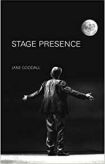Stage Presence: The Actor as Mesmerist by Jane Goodall
| Stage Presence: The Actor as Mesmerist by Jane Goodall | |
|
| |
| Category: Entertainment | |
| Reviewer: John Lloyd | |
| Summary: An academic tome that looks at the rare ideal of stage performance, whether it be Nijinsky causing riots, Bowie flashing Ziggy Stardust's eyes, or Sarah Bernhardt and her inimitable performances. Not for general reading, but a worthwhile non-fiction look at the world of stage appearances for those studying such matters. | |
| Buy? Yes | Borrow? Yes |
| Pages: 232 | Date: April 2008 |
| Publisher: Routledge | |
| ISBN: 978-0415395960 | |
|
| |
So this is a book called Stage Presence, by Jane Goodall (no, not that Jane Goodall), reviewed by John Lloyd (no, not that John Lloyd). Although, come to think of it, which John Lloyd might you be expecting? For, over the past four years I have been employed as a professional actor, and have taken on the task of becoming someone else.
And even with that experience I have to admit that sitting down and thinking about it, it is certainly a most peculiar thing, to engage with an audience. They have to sit in the right direction, I have to enter a particular space, and between them and me there is an unwritten contract, one where the first clause is that I deem myself worth their attention. And 75 minutes later, who is to say if everyone has met the terms of the contract? Would any disappointment be down to the play, the situation, the interest the audience had in being there in the first place, or me?
Who could say whether for that scene, on that day, that week, that term-time, that I was successfully a bearer of the specific it that allows for a compelling and worthwhile performance? That it has been written of countless times, and with this book we get a history of in which ways.
And a lot of writing about it has been pure guff. Back when acting was more of a novel thing, and certainly before everyone seemed to be born with stars in their eyes, there was a rarified atmosphere to the performer – witness the commoner perform as a King. The tradition of theatre – everything that forms the contract involved – was just being revised and fully formed (although it has been broken more often more recently, to such an extent that in contrasting Artaud and Brecht Goodall rightfully points out no-one can try and define an ideal correct way to appear to have it in acting).
So we see the relics of ancient ideas of the other in performance – the spirit carried from somewhere to his performance by the shaman, or the Greek priestesses. Were they really imbued with a presence from the other, that was carried over to an audience? Following on that theme of the unseen, science allowed writers to use the instance of electricity, to define something that linked the audience to the actor, and the actor to his or her power source. A hypnotic-seeming connection came later, with Mesmer being a large focus of many thoughts on what the stage presence gave to the viewer (and to some extent, what was given back in return).
With a greater media presence, more immediate reporting, and more scope for personal opinions to enter the world, we have many more instances of writing to choose from in seeing how the world reacts to the stage presence (and of course we now are bogged down by countless people thinking they form a stage presence – with charisma (they should look the word up first) or glamour (ditto)). And still the guff continues.
Kenneth Tynan is quoted here regarding Olivier's famous 'Oh! Oh!' , and one wonders how one can take it sensibly. Certainly the extract cannot convey the correctness of that 'Oh! Oh!', in the scope of the entire performance, the rest of the cast, the author's ideas, and everything else. Was it the same cry every night? Would even Olivier manage to peak at such occasion on a Saturday, 2:30 matinee in Cleethorpes? We have to take it as read that for at least one person, at least once in the run, Olivier had the ideal presence on the stage, and could impress completely.
This book goes much beyond the actor, however. Josephine Baker is included with a worthwhile section, and although her remit on stage seems to have been most limited (wear little, sparkle with bling and wiggle your bits) she is deemed to have had it. Callas, wowing people of all ages even if swamped by the distance created by the theatre at Epidauros and 19,999 fellow audience members; Nijinsky wowing people with his electrifying (well, it's catching) dancing, before causing riots with Rites, even Bob Dylan and his then alarming way with current topics in narrative blues-rock traditions. For me though the climax in this context is the demanding job to be undergone in performing Beckett's Not I – the actress is bound to something creating a completely rigid body structure, and hides in stygian blackness, only her hyperactive mouth and what comes from it ever seen in any light. There must be many ways to fail at performing this, but has the construct of the piece created its stage presence for it?
This book is certainly not the best for casual reading, and for a light entertaining hour or six would scrape a couple of Bookbag stars only. The style is noticeably academic, and several things the casual browser might wish for are lacking. One might be the effort in showing two sides to something, and an opinion being formed in front of us. Instead the mental leg-work has been done off-stage, and the authoritative result is what we get.
There is a little bit too much detail at times, and tangents carried to their full, but all the same little to scupper the academic in her or his reading. The common reader might wish for some more in the way of biography – but what we do get is fine. I was intrigued to read about Rachel, a singular French presence on stages, of great contemporary renown. She is one of at least two people here described as having something of the panther about her, while someone is deemed half kangaroo – remember my saying things were guff?
However Goodall's ideas, examples and constructed conclusions are certainly guff-free. This book cannot be taken as a how-to for stage presence – the very idea remains as ill-defined as the it Goodall soon drops. But I was certainly educated about the history of several performers, of varying eras and crafts, and had never come across such a book as this before, which rightly delves into the arcane world of opinion and writing that struggles on to this day in defining and conveying the singular and valued presence of those on stage, whether the Olivier or the seemingly skill-free world of Johnny Rotten.
We at the Bookbag are grateful for Routledge's review copy.
(Oh, and I'm not John Lloyd the tennis player, either.)
You might enjoy Showtime: A History of the Broadway Musical Theater by Larry Stempel.
Please share on: ![]() Facebook,
Facebook, ![]() Twitter and
Twitter and
![]() Instagram
Instagram
![]() You can read more book reviews or buy Stage Presence: The Actor as Mesmerist by Jane Goodall at Amazon.co.uk Amazon currently charges £2.99 for standard delivery for orders under £20, over which delivery is free.
You can read more book reviews or buy Stage Presence: The Actor as Mesmerist by Jane Goodall at Amazon.co.uk Amazon currently charges £2.99 for standard delivery for orders under £20, over which delivery is free.
![]() You can read more book reviews or buy Stage Presence: The Actor as Mesmerist by Jane Goodall at Amazon.com.
You can read more book reviews or buy Stage Presence: The Actor as Mesmerist by Jane Goodall at Amazon.com.
Comments
Like to comment on this review?
Just send us an email and we'll put the best up on the site.
John Haag said:
Stil don’t know whether the book is worth getting but the review was a great read.


